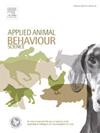社会环境对家马种马繁殖和总体福利的重要性
IF 2
2区 农林科学
Q1 AGRICULTURE, DAIRY & ANIMAL SCIENCE
引用次数: 0
摘要
确保家养马匹福利的义务是显而易见的。社会关系是野马日常生活的重要组成部分。在人类控制的条件下,种马通常独自生活在一个贫瘠的环境中,只有单独的盒子或围场,与同种动物的接触仅限于视觉上。尽管如此,许多种马仍不能经常进入围场和牧场。这引起挫折感和压力,这已被证明有助于形成陈规定型观念、自残、不正常的性行为和生殖问题。这篇综述强调了家庭环境如何与种马健康行为发展所必需的自然条件产生负面差异。我们解决了公马的福利和生殖问题,这些问题可能源于它们缺乏社会接触。这些问题都是在自由放养条件下的种马生命的各个阶段进行讨论的。我们假设今天的繁殖种马必须能够享受单身种马生活的积极方面。这应该包括充分考虑种马的生殖行为,包括与性接受母马的接触。这不仅可以改善动物福利,还可以确保最佳的精液质量和生育能力。本文章由计算机程序翻译,如有差异,请以英文原文为准。
Importance of the social environment for reproductive and general welfare of domestic horse (Equus caballus) stallions
The obligation to ensure the welfare of domestic horses is evident. Social bonds are an essential part of the daily life of feral horses. In human-controlled conditions, stallions usually live alone in a barren environment of individual boxes or paddocks with contact to conspecifics limited to visuals. Still, many stallions do not have regular access to paddocks and pastures. This provokes frustration and stress which has been shown to contribute to the development of stereotypies, self-mutilations, abnormal sexual behaviour and reproductive problems. This review highlights how domestic environments may negatively diverge from the natural conditions necessary for the healthy behavioural development of stallions. We address stallions' welfare and reproductive problems that may arise from their lack of social contact. These issues are discussed along the stages of a stallion's life under free ranging conditions. We postulate that today's breeding stallions must be enabled to enjoy the positive aspects of a bachelor stallion's life. This should include adequate consideration of the stallions' reproductive behaviour including contact with a sexually receptive mare. This will not only improve animal welfare but also ensure optimal semen quality and fertility.
求助全文
通过发布文献求助,成功后即可免费获取论文全文。
去求助
来源期刊

Applied Animal Behaviour Science
农林科学-行为科学
CiteScore
4.40
自引率
21.70%
发文量
191
审稿时长
18.1 weeks
期刊介绍:
This journal publishes relevant information on the behaviour of domesticated and utilized animals.
Topics covered include:
-Behaviour of farm, zoo and laboratory animals in relation to animal management and welfare
-Behaviour of companion animals in relation to behavioural problems, for example, in relation to the training of dogs for different purposes, in relation to behavioural problems
-Studies of the behaviour of wild animals when these studies are relevant from an applied perspective, for example in relation to wildlife management, pest management or nature conservation
-Methodological studies within relevant fields
The principal subjects are farm, companion and laboratory animals, including, of course, poultry. The journal also deals with the following animal subjects:
-Those involved in any farming system, e.g. deer, rabbits and fur-bearing animals
-Those in ANY form of confinement, e.g. zoos, safari parks and other forms of display
-Feral animals, and any animal species which impinge on farming operations, e.g. as causes of loss or damage
-Species used for hunting, recreation etc. may also be considered as acceptable subjects in some instances
-Laboratory animals, if the material relates to their behavioural requirements
 求助内容:
求助内容: 应助结果提醒方式:
应助结果提醒方式:


